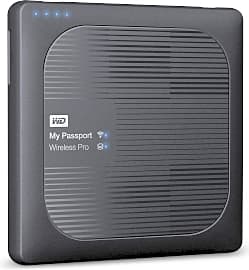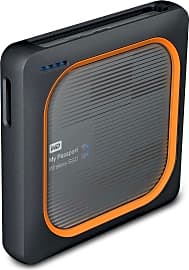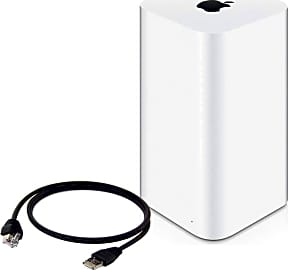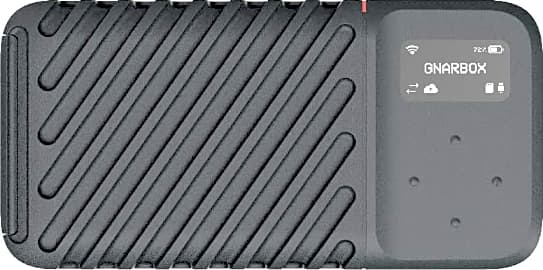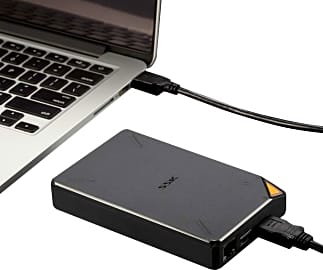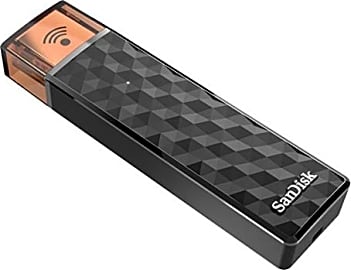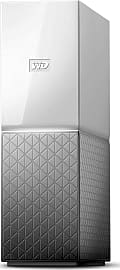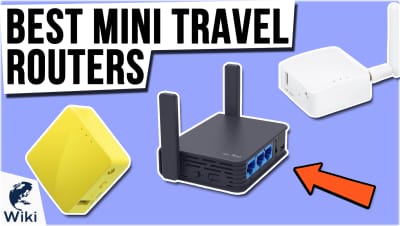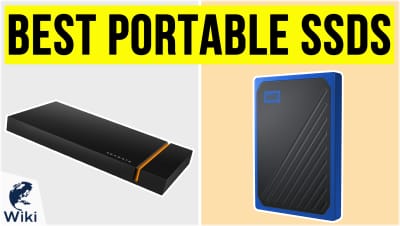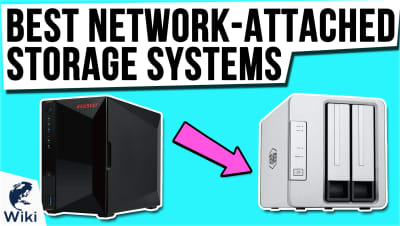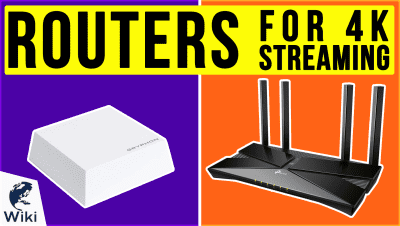The 9 Best Wireless Hard Drives

This wiki has been updated 40 times since it was first published in March of 2015. Nearly every piece of audiovisual entertainment is available in some digital format these days, and more workplaces are transitioning to paperless filing systems every day. So it makes perfect sense that some people need a way to wirelessly access data both at home and on the road. One of these Wi-Fi enabled hard drives should provide the versatile storage connectivity needed for work or play. When users buy our independently chosen editorial selections, we may earn commissions to help fund the Wiki.
Editor's Notes
December 06, 2020:
Since our last publication, the Toshiba Canvio AeroCast has become unavailable, so we pulled it from our list this time around. We also made a few additions: The Western Digital My Passport Pro builds on the programming features of the Western Digital My Passport, and has a very approachable price tag for a relatively high storage volume. The super-tough Gnarbox 2.0 is a great high-efficiency option for those who are on the go, but require something more substantial than a flash drive. And we added the Western Digital My Cloud Home for folks who don't require a lot of transportability, and are mostly concerned with a large storage capacity.
November 15, 2019:
If you're looking for a portable, personal drive that can serve as wireless network-attached storage, first we have to warn you: there aren't a whole lot of reliable and easy-to-use options. As such, one of your best options is probably the RavPower FileHub, which is essentially a mini travel router designed specifically to work with an external drive. This does mean you'll have to carry around two devices rather than one, but it's one of the few models that's been recently released and promises to work well for almost any use case.
If you really want a single device, though, there are a few capable options. The Western Digital My Passport is one of the best choices for on-the-go storage, thanks not only to its relative reliability but also its shock-resistant construction. The Toshiba Canvio AeroCast is another good one for use on the road, although its wireless speeds tend to leave a bit to be desired. For those looking to connect multiple devices to storage in the home, the Apple AirPort Time Capsule is worth a look, although it is pretty expensive. The SSK F200, on the other hand, is compact and quite inexpensive. And for maximum portability, look to the SanDisk Connect. It's not ideal for media viewing, but if you just need to share files to others around you, it's a good choice.
If you need a lot of storage and don't want to deal with slow speeds and clumsy user interfaces, we'd recommend looking into purchasing an actual network-attached storage system and a quality wireless router. This will let you tailor your equipment to your specific needs and allow you to access all sorts of data at high speed.
Do You Need A Wireless Hard Drive?
The average external hard disk drives connect via the USB port and have to be connected directly to the computer.
A wireless hard drive is an external storage device that connects to your computer through WiFi. It is intended to store important documents and media files and act as a backup for all of your information. It is essentially insurance against potential disaster as well as a convenient way to carry all of your data in one compact place.
It is very handy for transferring information from one computer to another. You have the option of either moving a few select files or backing up your entire system. If you are a frequent traveler, you can access your important files while you are away from home.
The average external hard disk drives connect via the USB port and have to be connected directly to the computer. The great thing about the Wireless Hard Drive is that because it connects through WiFi, you can access your files from anywhere provided it is connected to your home WiFi network.
Wireless hard drives operate on battery power and come with a variety of storage capacities. Some hold as much as 2TB of data and can back up an entire computer system and then some. If you have a lot of media stored on your computer, these wireless hard drives can effectively back up all of that information for you. Some of these drives can fit comfortably in your pocket and even have SD card slots for additional storage.
There are wireless hard drives that do not require an Internet connection to access files and operate on Bluetooth. Still others act as their own WiFi hot spots to connect several devices to the network at once, and some even work as portable chargers for smartphones. They can even act as independent media devices to connect and stream your content from anywhere.
Your Options Are Limitless
Once you have made the decision to purchase a wireless hard drive, it's time to decide what elements you need to consider.
As with any purchase you plan to make, first consider the purpose for your hard drive in order to determine what features you might need. Do you need something to carry files with you while traveling? Do you need a way to access your files when you're away from home? Are you looking for something with high storage capacity to back up your pictures, videos, and other media? The answers to these questions will ultimately determine your budget and the type of wireless hard drive that you purchase.
Do you need a way to access your files when you're away from home?
If you choose a wireless hard drive that operates on a WiFi connection, take a quick moment to determine how well its passthrough (or bridge) feature functions. When it connects to your home WiFi system, it will act as a link between your devices and your wireless connection. In some cases, this can slow down your wireless connection speed.
Next, find out how many devices you can connect to your wireless hard drive at one time. Many of these hard drives can support approximately five to eight devices. If you plan to use high definition media across your devices, a wireless hard drive that supports a high number is a good choice.
After that, make a choice between a solid state drive and a regular hard disk drive. A solid state drive generally holds up better to bumps and knocks and is great for transporting documents during travel. However, a regular hard disk drive is going to give you way more storage capacity and be an excellent choice for media junkies.
Finally, check the maximum battery life in the hard drive you plan to purchase. If you are simply using it to back up documents and the occasional set of photos, you might not need an extensive battery life. However, if you use it to stream media or need to back up multiple files every few hours, you're going to want a battery life that is no less than four hours. Also, make sure that your wireless hard drive can be charged by connecting to the USB port on your computer. This allows for added convenience and file transfers during charging.
A Brief History Of The Wireless Hard Drive
The original hard drive, called the RAMAC 305, was created by IBM in 1956. It was requested by the United States Air Force. The very first computer hard drives were external devices simply because they were large and cumbersome and could not fit inside computers at the time. IBM recognized the need for saving files to some sort of electronic device once work was completed on the computer system. This hard drive was comprised of fifty aluminum disks and held five megabytes of data.
IBM introduced the 1301 model in 1962, and by the end of the year, other companies were selling similar types of external hard drives. IBM continued to lead the way and produce new hard drive models throughout the years. In 1967, they introduce the first floppy disk as a more convenient means of external storage. By 1982, Sony had released a similar floppy disk that was much smaller than the original at 3.5 inches making it easier to transport.
The need for external hard drives has increased in recent years with more and more information being stored electronically. Many businesses and government institutions have recognized the need for backing up their data on external storage. External USB drives and wireless hard drives have become convenient methods of protecting and transporting important data.


